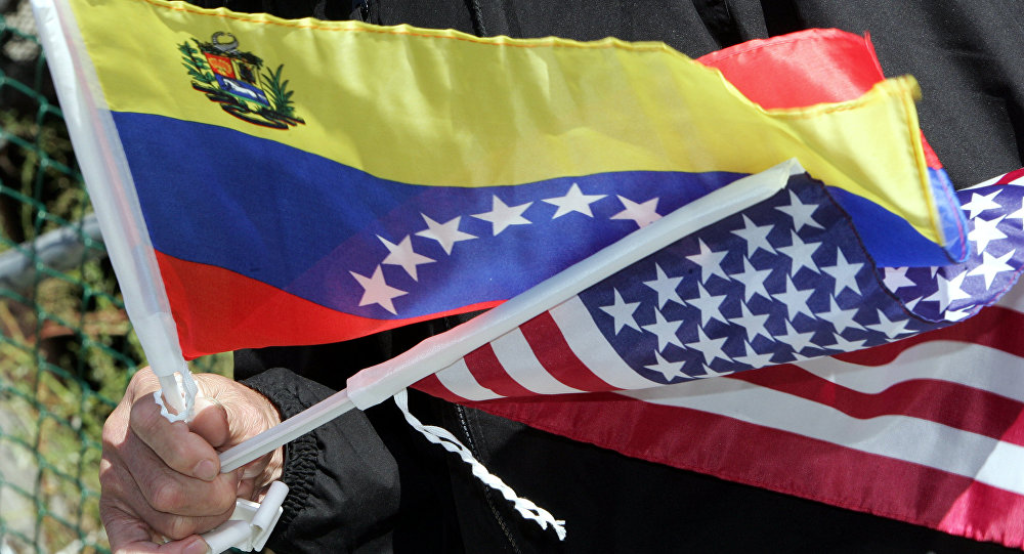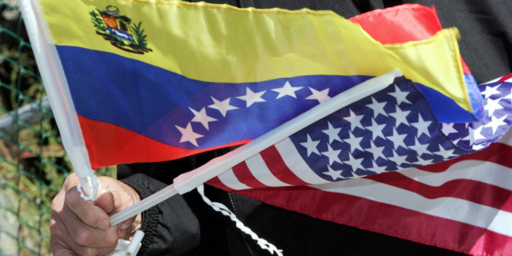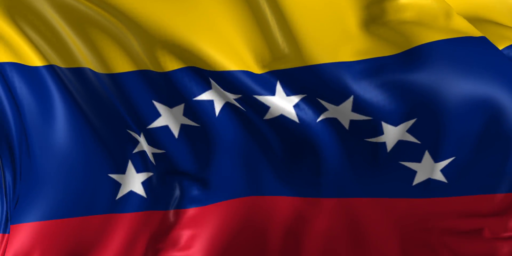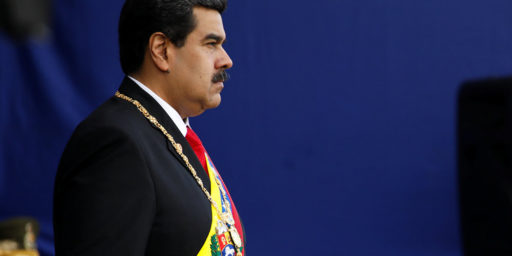Juan Guaidó Won’t Rule Out U.S. Intervention In Venezuela, But Americans Should
The self-appointed Acting President of Venezuela has said he doesn't rule out the idea of American intervention in his country, but we should rule it out immediately.

Juan Guaidó, the self-proclaimed Acting President of Venezuela, is refusing to rule out the idea of American military intervention in Afghanistan:
Venezuela’s self-proclaimed acting president Juan Guaido refused to rule out on Friday the possibility of authorizing United States intervention to help force President Nicolas Maduro from power and alleviate a humanitarian crisis.
National Assembly leader Guaido told AFP he would do “everything that is necessary… to save human lives,” acknowledging that US intervention is “a very controversial subject.”
The opposition leader launched a bid to oust Maduro last month, declaring himself interim president, a move recognized by the US and around 40 other countries, including 20 from the European Union.
Under Maduro’s stewardship, oil-rich Venezuela’s economy has collapsed leaving the country wracked by hyperinflation, recession and shortages of basic necessities such as food and medicine.
“We’re going to do everything that has a lower social cost, that generates governability and stability to deal with the emergency,” said Guaido, 35.
He is trying to bring in food and medicines from the US but the supplies are stuck in warehouses in Colombia because the Venezuelan military has blocked their entry.
Earlier, Maduro vowed not to let in “fake humanitarian aid” and claimed Venezuela’s crisis has been “fabricated by Washington” to justify intervention.
Guaido says 300,000 people could die if desperately-needed aid isn’t brought in.
(…)
Guaido still has faith that the military can be won over, appealing to their sense of humanity.
“The armed forces have a huge dilemma, whether or not to accept the aid. It would be almost miserable at this point of huge necessity not to accept it,” he said.
“Inhibiting the entry of this aid could be seen as a crime against humanity.”
Guaido said the military has to decide whether to “take the side of the constitution” or to “continue on the side of an increasingly isolated dictator.”
But he said “fear” was preventing more top ranking members of the armed forces from switching sides and joining air force general Francisco Yanez who last weekend disavowed Maduro.
“We’ve seen some National Guard sergeants who’ve shown unhappiness and they’re being tortured. One of the sergeants’ relatives is missing.”
Consultants Eurasia Group said on Thursday that Maduro’s traditonal allies Russia and China are “unlikely to lend (him) meaningful support,” reinforcing its view that the socialist leader “will be unable to sustain his regime.”
Guaido agrees that no-one will come to Maduro’s rescue.
“I’m not very worried… Maduro hasn’t had a new line of credit since 2016,” said Guaido.
The Maduro government, of course, has shown no intention of stepping aside in the wake of Guaido’s assertion that he is the legitimate ruler of the country and has instead used it as an occasion to further clamp down on his political opposition and the protests against his regime, which appear to be growing amid increased political and economic unrest in the country. One of the most immediate crises impacting the people has been the fact that there are massive food shortages that are threatening to lead to hunger and starvation in a nation that ought to be among the wealthiest in Latin America thanks to its oil reserves. In response to these shortages, the United States and other nations have responded with food aid, but that aid is not reaching the people because the Maduro government is refusing to allow delivery caravans from Colombia to enter the country. While some Venezuelans have managed to cross the border into Colombia to obtain food and medical supplies, there are vast numbers of people who cannot reach that border and who are suffering as a result.
The issue of American military intervention in Venezuela isn’t a new idea, and the fact that the Trump Administration not only recognized Guaidó as the legitimate leader of Venezuela but also apparently consulted with him prior to his declaring himself President is not surprising and is largely consistent with the policy that has been in place since George W. Bush’s Administration. At the same time, though, it is somewhat concerning given the fact that Trump has, as is his habit, upped the rhetoric since taking office and suggested far more radical action than his predecessors. In August of 2017, for example, Trump suggested that a ‘military option’ was on the table with regard to American policy toward the Maduro regime. Last September, we learned that American representatives had met with Venezuelan coup plotters. Although nothing came of those talks, as I suggested at the time the news was nonetheless significant due to the uptick in confrontational rhetoric from the Trump Administration. More recently, National Security Adviser John Bolton, who was spotted at the White House after a meeting about the situation in Venezuela carrying a notepad that made reference to “5,000 troops” being sent to Colombia, has said that a military option was on the table but that nothing was imminent. Because of this, how the U.S. responds to these latest developments bears watching, especially if the President becomes tempted to lash out at a new target as his situation at home becomes more and more politically perilous.
Daniel Larison makes note of Guaidó’s comments, but makes a forceful argument against American military intervention:
Attacking Venezuela would be a costly and unnecessary war for the U.S., but more than that it would be a calamity for the people of Venezuela, whose country would be plunged into even worse conditions for the duration of the conflict. The U.S. needs to be willing to consider some sort of compromise solution, whether it is a power-sharing arrangement or negotiations that lead to the holding of early elections. An all-or-nothing approach to the crisis is likely to lead to escalation, and so far that has been the only kind of approach that the Trump administration knows how to do. Military intervention would be the absolute worst form that approach could take, and Congress and the public need to oppose any moves by this administration in that direction.
As Larison also points out, appearing to advocate in favor of outside military intervention also seems like an unwise move on Guaidós part because it has the potential to undercut the possibility of his receiving support from the one institution in Venezuela that could bring a quick end to the Maduro regime if it wanted to, the Venezuelan military. So far, the military continues to stick with the Maduro regime in no small part because he has been sure to stock the leadership with people who owe their place in power to him. Calling for, or appearing to advocate for, outside intervention by the United States or any other nation gives those leaders more incentive to stick by Maduro’s side both to ensure their own continued place in power and to avoid being cast as traitors conspiring with foreign powers to overthrow the government. Additionally, as we’ve seen in the past, Maduro has been quick to crack down on rebellious members of the military. In that context, it seems unlikely that many Generals who already owe their place in the chain of command to Maduro will stick their necks out for a man who appears to be welcoming the idea of an American invasion.
Another against American intervention, of course, is the fact that it would be a significant step backward in terms of the manner in which the United States has interacted with Latin America. For the better part of the 20th Century, of course, the United States engaged in what can only be described as a policy of colonialism toward its Central and South American neighbors, overthrowing governments at will, intervening in civil wars, backing dictators over democratically elected leaders, and allowing corporations to essentially take control of entire nations, especially in the agriculture field. In other words, the United States was fully earning the title of “Ugly American” often directed against us. Over the course of several decades, and especially since the end of the Cold War, we’ve managed to move past that era into one where the United States has become more of a partner with its neighbors to the south. Intervening in the internal affairs of a Latin American nation like Venezuela risks ruining all of the work we’ve done to move past those bad old days.
Finally, American intervention against the Maduro government would be unjustified on two grounds. First of all, as of now, there is no Congressional authorization for such action. Absent that, any military action the President would take would be illegal and unconstitutional. If President Trump really wants to intervene military in Venezuela, let him make his case to Congress and let the people’s representatives have their say. This is what the Constitution requires, and it should not be ignored. Second, the simple fact of the matter is that the Maduro regime does not pose a threat to American national interests sufficient to justify military intervention, and the United States certainly cannot afford either a war in South America or the prospect of having the political future of that nation on our hands for who knows how long. In the meantime, along with much of the rest of the western world, we have recognized Juan Guaidó as the legitimate leader of the country. Our job now should be to find a way to bring an end to the current political crisis and, of course, to get the people of Venezuela the food and medical aid they are being deprived of by a regime that cares more about its hold on power than it does the suffering of the populace. Beyond that, we need to stay out of this situation.




If there is to be outside military intervention in Venezuela the participants should be Columbia and Brazil, no the US.
Yes, threatening US military intervention was a strategic mistake by Guaido, but we should fear that Tiny will view it as an invitation and it is doubtful that he’ll seek Congressional approval. Earlier today there was an article to the point that Republicans in Florida, see the situation in Venezuela as a cudgel to use against Dems, if Dems are not supportive of Tiny. Short term political advantage will be determinant.
Often the “all options are on the table” rhetoric is understood to be a bluff. With el Cheeto, though, and being advised by Bolton, who the hell knows.
I’m hoping no one in what passes for an administration will think of the War Powers Resolution. Dennison is stupid enough to believe he can take down Maduro, and install and secure Guaido, in 60 days or less. Hey, didn’t Reagan do it in Grenada and Bush the elder in Panama? How hard can it be?
@Sleeping Dog:
The Brazilian Military has ruled out a military intervention. As I pointed out there is only ONE road connecting the least populated Brazilian state to Venezuela, and this state(Roraima) is not connected by paved road with the rest of Brazil. You’d have to move large numbers of troops to Manaus by boat and then move then north to Roraima.
And the Brazilian Military, even with an idiot like Bolsonaro as president, would not want large number of American troops in the Amazon Region, and just Brazil or Colombia does not have the troops for a Military intervention on this scale.
If you are entering Venezuela from both Brazil or Guyana you would have to cross the Orinocco and then face a Stalingrad-style battle to cross Ciudad Guayana. From Colombia the geography is not much better, with the Colombian Andes separating the two countries.
And yes, one just has to google Caracas to see large mountains on the background. Even if you managed to put troops on Venezuelan territory it would be very difficult to control the large cities. Unless Trump is talking about bombing something there or there.
@Sleeping Dog :
It won’t work. Why? Because most Americans don’t give a sh$t about Venezuela and can’t fathom a reason to send the military there.
At least in places like Syria there’s the fig leaf of “terrorist prevention” and going after ISIS. What in Venezuela that the average American thinks is a threat worth risking American lives? Other then just straight up “support the President’s decisions or else” Repubs are going to have a hell of a time drumming up support for military intervention in what looks like a civil war to most. Add in that the number of refugees headed north would swell if the US stuck their nose into this mess and the border issues it would cause and the GOP has a pretty unpopular issue to push.
Afghanistan was vengeance for 9/11 – so was Iraq. We’re still there nearly 2 decades later. Syria was an intervention that also is on-going to the public’s displeasure and Trump wants to add another one? There will be no flag-waving swell of support like Bush got. How in the world could they think this would be a wedge issue??